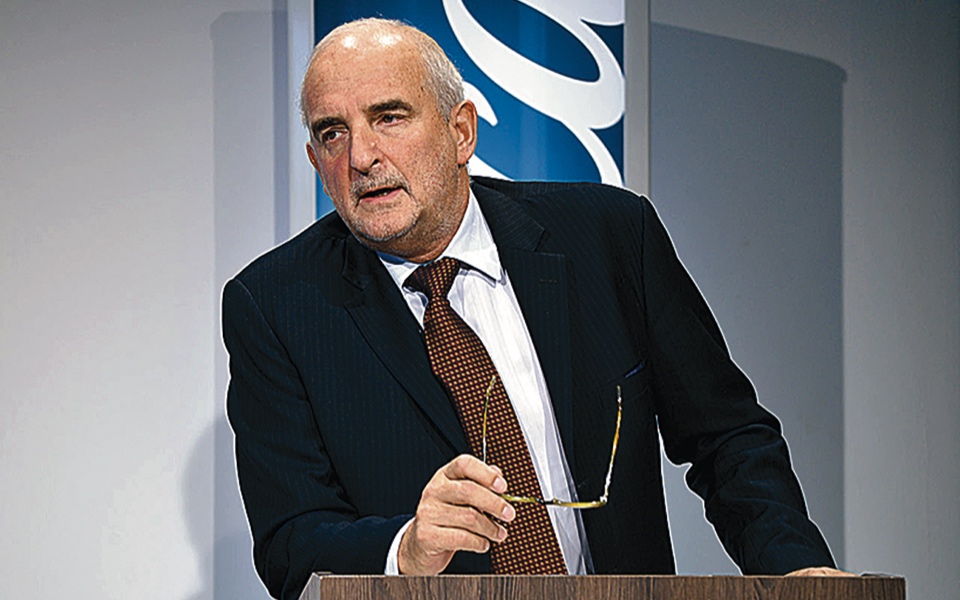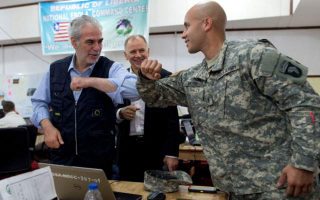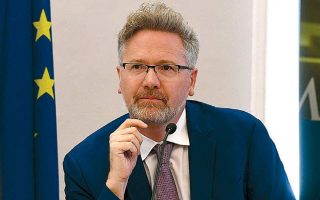Roger Cohen: ‘It’s a leaderless world right now’

Roger Cohen is one of the New York Times’ most famous commentators, having joined the paper in 1990. Kathimerini recently had the opportunity to discuss the impact the coronavirus crisis will have on the world, and on us humans.
What is going to change in the world after the coronavirus crisis?
I think at this point it is very hard to say. We do not know how long it will go on. I think what is clear is that a lot of people are looking back at their past lives before the world closed down and they are giving a lot of thought to ways of rebalancing their existences.
Is it necessary to travel that much? Are we taking enough account of the impact on nature of frenetic existences? Do we really need all this status anxiety? Could we cook at home a little more? Do we need to have food delivered? Do we need that holiday on the beach? Do we want to throng through airports as much as we had? It’s very hard to gauge how much of those kinds of reflections will result in durable changes of behavior. I do not know. But I certainly think there will be that reflection.
I don’t think there’s going to be a steep bounce-back. In other words, I do not think that by the end of the year the economy is just going to bounce back. I don’t see that.
I think there’s some form of radical reassessment happening and it’s as if our little planet has said, “Hold on a second, we’re going to hit the pause button here just so everybody can think for a minute.” But of course we don’t know how long it’s going to last, we don’t know how severe it’s going to be.
In the United States there’s going to be tens of millions of people without jobs and we don’t know the extent of the financial disaster. So there are a lot of unknown variables.
How about the moral standing of the US? Do you think it has been affected by the crisis?
Yes. I think it had already been affected by President Donald Trump. Everybody at this point knows he blows his mouth off. He doesn’t know what he’s talking about a lot of the time, he’s endlessly needy, his ego knows no bounds, he’s not a reliable partner, he goes by his gut, and his gut does not always tell him the right thing.
He’s been very lucky for three-and-a-half years and then he hit the mother of all crises and I think that – of course millions of Americans don’t agree – but I think a lot of Americans see how dangerous a combination of inhumanity and incompetence can be. And a devouring ego that makes you pay more attention to the ratings of your daily Covid-19 sitcom show than to the fact that hundreds of people are dying… somebody who does that clearly to many people seems a little disturbed. And one thing that’s evident is that there is a reign of terror in the White House. I mean in a normal administration some aide would say: “Mr President, maybe on a day when 712 people died in New York it’s not the moment to boast about your ratings with this daily press briefing you do. Maybe hold off that for a couple of weeks.”
But there’s nobody around, he’s on his own. There’s nobody around him who can reign him in at this point. There has been no UN Security Council statement, there’s no sense. Where’s the US secretary of state, where is Mike Pompeo, where is he? There’s never been a major global crisis with such a total absence of the US secretary of state – who, incidentally, is one of the worst US secretaries of state in history.
So, it’s a leaderless world right now. This is a pan-demic [sic]. So it needs a pan-response. A global response. And all these issues, whether it’s pandemics or climate change, they can only be addressed globally.
The thing is that that need is clear to many people but it’s occurring at a time when Xi Jinping, President Trump, Viktor Orban, Vladimir Putin, [Narendra] Modi in India and others are veering in a nationalist direction. So the hopes that the lesson of the interdependence of the planet that the pandemic is broadcasting loud and clear, the likelihood of that lesson really being learned in this nationalistic environment I fear is low. And that’s worrying.
Do you think this whole battle between autocracy and classic liberal democracy is going to be tougher after the crisis in a way?
I think it is. My concerns are even more immediate than that. I think that Orban’s move to rule by decree, totally unnecessarily, has illustrated that the coronavirus is a useful ally to dictators because it allows all kinds of extraordinary measures.
Who’s talking about Donald Trump’s wall today? Nobody. And there are barriers going up all over the place, so there’s no need to talk about a wall or whether there should be a wall; there are barriers everywhere, there are extraordinary measures being taken everywhere, there are people not being allowed out of their homes. In some cities in Europe you have to have an “attestation,” as the French say, some kind of document that demonstrates your need to be out. So, all kinds of top-down, severe restrictions are being placed by rulers that, yes, are called upon to take exceptional steps.
But the step from that to what Viktor Orban has done is not a huge one and when you get a character like President Trump, whose natural inclination is much more to be close to an Orban than it is to be close to a [German Chancellor Angela] Merkel, when you get something like that and you have an election coming up in six or seven months, and already we’re seeing he’s opposing write-in voting, you saw what happened in Wisconsin – an election that shouldn’t have been held in those circumstances – and the way in the lockdown there’s a natural bias towards rural areas in which the Trump vote is strong – you know, you have a lockdown in towns and cities in the Midwest that would tend, perhaps, more Democrat, more [Joe] Biden, and then you don’t have it in rural areas. I mean, there are all sorts of things that led one, I think, to legitimate fears that this could be a compromised election or even that the election could be called off.
What are the chances of Trump being re-elected?
Most polls show Joe Biden ahead. Joe Biden has felt very marginal in the last six weeks. His performances in the videos from his library at home at times have appeared incoherent or even doddery, and I don’t think many Democrats are feeling a sudden surge of excitement at the idea of a Joe Biden nomination. He was nominated, I think, because there was a kind of rush to safety when the virus first… when it became clear to Americans that this virus was serious. You saw [Elizabeth] Warren faded, [Bernie] Sanders faded, and there was a kind of rush to safety. I don’t know right now. Are Americans looking for security or are Americans dreaming of some kind of Kennedy-esque renewal, in these difficult, difficult circumstances? If it’s security, then Biden maybe fits the bill. I think I would put Trump’s chances of re-election at about 50 percent.
Have any heroes emerged out of this? New stars, like Anthony Fauci or Andrew Cuomo, or someone else?
Certainly Cuomo has been very effective as the governor of New York State, he’s been present, consistent, frank, human. We’ve had no word from President Trump of empathy, not one, not empathy for Italy, an ally, nor empathy for Americans, nothing. He is incapable of empathetic feeling. So somebody who is warm and empathetic and at the same time direct, like Governor Cuomo, certainly that has a powerful effect. I don’t think there’s any road to a Cuomo candidacy at this point unless Biden encounters some health issue or other major issue.
I think Governor [Gavin] Newsom in California has been having a good war, as the British used to say, he’s come through all this looking pretty good. And then, of course, there are all the anonymous… you have the first responders, the doctors, the people on the front line and the delivery people; there are a lot of people who are putting their lives at risk to keep America functioning and fed and where possible healthy.
What’s it like living through this crisis in New York City?
Well, you know, I look out across the East River from my apartment in Brooklyn Heights, I see FDR Drive, which is the drive that goes up the east side of Manhattan island and it’s probably the busiest street in New York, and I see a car passing now… and now another car… It’s very, very strange and sometimes the city can feel post-apocalyptic; when you see these discarded latex gloves and discarded masks and at night the only sounds are sirens and birdsong.
I’ve ventured into Manhattan twice in the last month, biked over the Brooklyn Bridge and back up the Manhattan Bridge, and down around Tribeca and Chinatown… there can be a certain beauty to the ghostliness and then at other times it’s just eerie and spooky. And you see these images of triage tents and mass graves and mobile morgues, and it’s pretty harrowing.
All that said, New Yorkers look out for each other. For all the ambition and all the egocentricity in New York, New Yorkers look out for each other. That’s one of the great secrets of New York and I think there’s a tremendous feeling of solidarity here and the feeling that we’ll get through it. But, I mean, it’s the Wuhan of America right now and we’ve just got to get through to the other side.





